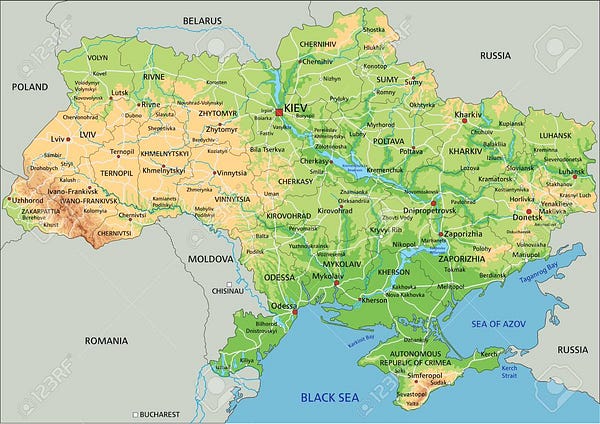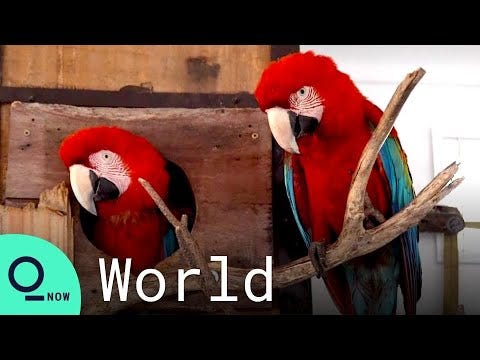A shorter one this week!
Hi, I’m Gavin. This is my experimental newsletter that explores thinking - how we might think better and learn together as we do so.
I explore several key topics through the lens of several core themes: systems thinking, scenario planning, trends, and cross-disciplinary innovation. These often relate to key issues: climate change, pandemics, astronomy, physics, health, history, philosophy, culture, rocketry, conflict, the impact of technology on society and more (lol!). With a larger question behind it all: how do we progress and how do we progress better?
I hope you like where we go. (945 - nope - 947 of us now! - welcome all new arrivals)
Gavin
PS: if you like the newsletter please share it! (And I always appreciate tweets about it too!) 🙏
If you support this newsletter and really like it you can also become a paid subscriber - you get nothing different except the satisfaction of knowing that you’re supporting this current weekly missive!
Reading list - the best stuff to read
(The best reads I’ve come across, with excerpts, links, authors and how long it will take to read. Climate change, COVID and China are consistently the stories at the top so are semi-permanent)
🌏 Climate change & biodiversity destruction
Large wildfires in Argentina:
Nearly half of bald eagles tested across US show signs of chronic lead exposure (2 mins by AP)
Lead ammunition for waterfowl hunting was banned in 1991 due to concerns about contamination of waterways, and wildlife authorities encouraged the use of non-toxic steel shot. However, lead ammunition is still common for upland bird hunting and big game hunting.
At the University of Minnesota’s Raptor Center, veterinarian and executive director Victoria Hall said that “85 to 90% of the eagles that come into our hospital have some level of lead in their blood”, and X-rays often show fragments of lead bullets in their stomachs.
Eagles with relatively low levels can be treated, she said, but those with high exposure can’t be saved.
🦠 COVID-19
We’re entering the control phase. (14 mins by Katherin Wu)
SARS-CoV-2 is an entirely different pathogen, but our current response to it risks rehashing some of the failures of the early HIV response, shifting the burden of suffering to the vulnerable. The task of taming this new threat, El-Sadr told me, can and should bear hallmarks to the successful strategies we’ve leaned on before. There’s even opportunity to riff and expand on the templates that past pandemics have offered: to introduce paid sick leave and food assistance; to speed the development of safer housing options; to meet the needs of people who are chronically ill, immunocompromised, and disabled; to address the inequities that have concentrated suffering in marginalized populations, both domestically and abroad. Pandemics are an opportunity to respond in the present but also prepare for the future. And if SARS-CoV-2 sparks its own revolution, that won’t be the first time a virus has catalyzed lasting change. “When there’s no trust, it’s often because people feel they haven’t been listened to,” El-Sadr said. “In the HIV world, we always say, ‘Nothing about us without us’”—no decisions should be made about the fate of a particular group of people without their involvement. “I think that’s at the core of it.” It’s true that some of the best public-health interventions are ones we don’t notice. But others succeed precisely because they enlist people’s attention and use it.
The Seven Habits of COVID-Resilient Nations. What can we learn from countries like South Korea? (6 mins by Uri Friedman)
“How did South Korea escape the pandemic relatively unaffected economically, with deaths at such low levels, while now vaccinating at such a high level that it has protected itself from future waves of illness and harsh lockdowns?” the public-health expert Devi Sridhar recently inquired. “That’s the question we should all be asking.”
🇨🇳 China / Taiwan
What do the coming holds for the US v China international world order? This explores it. Lines are being drawn and countries will have to choose which side they’re on. A conflict may be the end result. (20 mins by Michael Beckley)
The architecture of the new order remains a work in progress. Yet two key features are already discernible. The first is a loose economic bloc anchored by the G-7, the group of democratic allies that controls more than half of the world’s wealth. These leading powers, along with a rotating cast of like-minded states, are collaborating to prevent China from monopolizing the global economy. History has shown that whichever power dominates the strategic goods and services of an era dominates that era. In the nineteenth century, the United Kingdom was able to build an empire on which the sun never set in part because it mastered iron, steam, and the telegraph faster than its competitors. In the twentieth century, the United States surged ahead of other countries by harnessing steel, chemicals, electronics, aerospace, and information technologies. Now, China hopes to dominate modern strategic sectors—including artificial intelligence, biotechnology, semiconductors, and telecommunications—and relegate other economies to subservient status. In a 2017 meeting in Beijing, Chinese Premier Li Keqiang told H. R. McMaster, then the U.S. national security adviser, how he envisioned the United States and other countries fitting into the global economy in the future: their role, McMaster recalled Li saying, “would merely be to provide China with raw materials, agricultural products, and energy to fuel its production of the world’s cutting-edge industrial and consumer products.”
Nature has a breakdown of China’s space plans for the next five years. (5 mins by Elizabeth Gibney)
China also plans to launch a space telescope called Xuntian, whose name means ‘survey the heavens’. This will image in the same wavelengths — ultraviolet, visible and infrared — as those used by NASA’s Hubble Space Telescope.
Slightly smaller than Hubble, Xuntian will not quite match its predecessor’s resolution; but, at any one time, Xuntian will capture a patch of sky 300 times larger. That will allow it to probe a much greater volume of the Universe than Hubble, says Zhan, who works on Xuntian.
🇷🇺 🇺🇦 Russia / Ukraine
This is as good as an analysis as I’ve been able to find about the likely route Russian forces will take in Ukraine (though some claims are dubious - I’d mainly focus on the look at the process of invasion starting at 6:43 which is itself is a reflection of US thinking on how the invasion would play out). (14 mins)
I also liked this thread on Ukraine history:


I’ve continued to add sources to my Ukraine list if you want to follow along there.
Does the U.S.-Russia Crisis Over Ukraine Prove That the Cold War Never Ended? (5 mins by Robin Wright)
🤑 Crypto
Interesting read on crypto and NFTs. (25 mins by Will Stephenson)
Despite the promise of an open bar, I wasn’t eager to go to the party, which was to be centered on an NFT auction. The term “NFT auction” itself was, in fact, enough to make me want to jump out of the car and start hitchhiking toward the airport. The easy jargon and self-satisfaction of most of the crypto-evangelists I’d met had begun to leave me cold and worn out. Put another way, my curiosity had been satisfied. Truthfully, I regretted ever investing any money in this stuff, which appeared increasingly cynical and nebulous. All the imagination and resources being spent on glossy new financial market infrastructure—it was profoundly discouraging. Maybe in a few years we’d all be living in the metaverse, trading social tokens (Chupacabra coin, perhaps), but I figured I’d rather opt out for now. Contra The Bitcoin Standard, it seemed far more like a symptom of decadence than a cure for it.
I’d also recommend this very good discussion on crypto and NFTs on Twitter spaces.
👩🚀 Space - more commercial astronauts
Tim Dodd interviews Jared Isaacman over the recent announcements of more commercial crew launches. (21 mins)
Scott Manley covers the same thing here (18 mins):
Good read: on escaping Earth.
⚡️ Energy - controlling the tokamak with AI
Deepmind published some interesting research. Controlling plasma is hard - AI can help. (5 mins by Deepmind)
Similar to progress we’ve seen when applying AI to other scientific domains, our successful demonstration of tokamak control shows the power of AI to accelerate and assist fusion science, and we expect increasing sophistication in the use of AI going forward. This capability of autonomously creating controllers could be used to design new kinds of tokamaks while simultaneously designing their controllers. Our work also points to a bright future for reinforcement learning in the control of complex machines. It’s especially exciting to consider fields where AI could augment human expertise, serving as a tool to discover new and creative approaches for hard real-world problems. We predict reinforcement learning will be a transformative technology for industrial and scientific control applications in the years to come, with applications ranging from energy efficiency to personalised medicine.
The paper is here. Deepmind blog post here.
Philosophy Corner (a journey through thinking about thinking every week)
(A serialised section that started with Greek Tragedy and moved to philosophy. Something to spark ideas. Feel free to go backwards!).
This episode was great so it actually featured in this newsletter before. But it’s next up:
Douglass on Slavery (47 mins)
Documentary
(A good thing to watch - also serialised - so feel free to go back through past editions!)
Hiatus this week! Suggestions welcome.
Podcast(s)
(The best stuff I’ve listened to, or been recommended by subscribers)
I enjoyed the lengthy interview of Lex Fridman and Tim Urban. (200 mins)
This podcast covers the idea of OSINT investigation or “digital sleuthing”, an area I used to work in. A good overall view from different perspectives. (30 mins)
I can’t really recommend Ezra Klein this week - one episode in particular featured Johann Hari - someone who makes stuff up.
Still in my tabs
(Or stuff I haven’t read yet, but looks promising)
Unprecedented oil spill catches researchers in Peru off guard
This super-realistic virtual world is a driving school for AI
To have an impact, plant-based meats must replace animal-based ones. They’re hardly making dent.
A Billion Years Before Sex, Ancient Cells Were Equipped for It
Fighter Pilots Need More Time in the Air
Astronomers may have found another planet around Proxima Centauri, the sun’s closest neighbor. (a follow up to last week’s news)
Bright Flight, by Vanessa Gregory The mysteries of firefly synchrony


